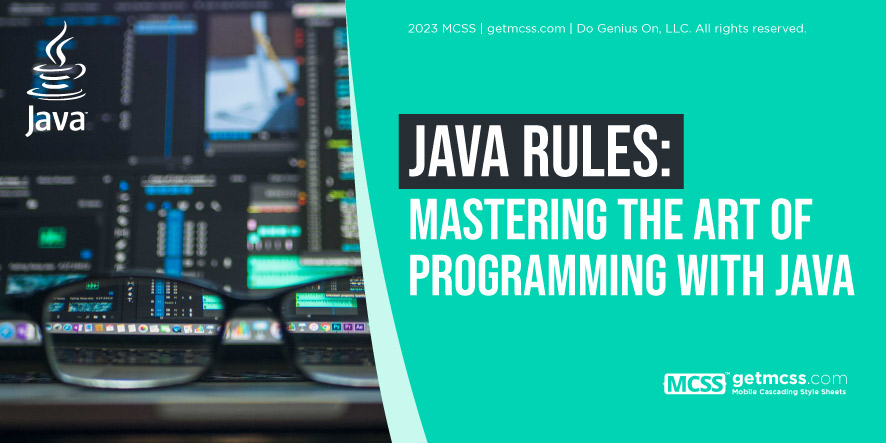Java, a high-level programming language developed by Sun Microsystems, has been ruling the world of programming for over two decades. With its promise of "Write Once, Run Anywhere" (WORA), Java has become a staple in the world of software development, from enterprise-level applications to mobile apps. In this article, we will delve into the Java Rules that make it such a powerful and versatile language.
Understanding Java
Java is an object-oriented programming language, which means it organizes data into objects and defines the behavior of these objects through classes. This approach makes Java highly reusable and easy to maintain, two qualities that are essential in today's fast-paced software development environment.
The Power of Java
Java's power lies in its robustness and security features. It is designed to be secure from the ground up, reducing the risk of security breaches. Furthermore, Java's strong memory management and automatic garbage collection prevent memory leaks, enhancing the performance of applications.
Java Rules to Follow
To harness the full potential of Java, there are certain rules or best practices that developers should follow. These rules not only make your code more efficient but also more readable and maintainable.
Rule 1: Always Encapsulate Your Data
In Java, encapsulation is the practice of keeping fields within a class private and accessing them through public methods. This rule ensures that your data is protected and can only be manipulated in controlled ways.
|
public class Student { private String name; //variable with restricted access// Getter public String getName(){ return name; } public void setName(String name) { this.name = name;} } |
Rule 2: Favor Composition Over Inheritance
While inheritance can be useful, it can also lead to a high degree of coupling between classes. Composition, on the other hand, promotes a high degree of flexibility and leads to a system that is easier to maintain and evolve over time.
Rule 3: Code to Interfaces, Not Implementations
This rule encourages developers to depend on abstractions, not concrete classes. This approach makes your code more flexible and adaptable to change.
|
// Interface interface Student { public void average( int subject, int idStudent); public void name( int idStudent); public void subjects(int idStudent); } //Implements the PrimaryStudent interface class PrimaryStudent implements Student { public void average(int subject, int idStudent) { System.out.println("Average student's subjects"); } public void name( int idStudent){ System.out.println("Student's name"); } public void subjects(int idStudent) { System.out.println("Student's subjects"); } } |
Java in the World of Mobile App Development
Java has been a key player in mobile app development, thanks to its robustness, security, and scalability. It is the primary language for Android app development, the most popular mobile operating system in the world.
Why Java Rules in the World of Programming
Developed by Sun Microsystems in 1995, Java was designed to be "Write Once, Run Anywhere" (WORA), allowing developers to write software on one platform and run it on any Java-supported platform with no recompilation.
Key Features that Make Java Rule
-
Platform Independence: Java is designed to be platform-independent at both source and binary levels, which means it can run on any device that has a Java Virtual Machine (JVM).
-
Object-Oriented Programming (OOP): Java adheres to the OOP paradigm, promoting a clear modular structure that makes code easy to maintain and reuse.
-
Rich Libraries: Java offers a vast array of standard libraries that aid in developing robust applications with ease.
For more information on the language's capabilities, refer to this post, What is a native mobile application and why should you prefer, which talks about the power of Java and its role in developing native mobile applications.
Java in Enterprise-Level Applications
Java's power lies in its scalability, stability, and secure features, making it the first choice for enterprise-level applications.
Java and Large Scale Systems
Large corporations worldwide utilize Java for its performance, security, and robustness, especially when it comes to handling large amounts of data. Companies like Google, Amazon, and Facebook use Java to maintain their complex systems and ensure smooth and reliable services.
Java and Microservices
Java also shines in the world of microservices. Frameworks like Spring Boot have made it easier to develop and deploy microservices using Java. For more on how Java aids in the development of scalable applications, check out our article on the Future of Mobile App Development.
Java and Mobile Application Development
Java's robustness extends beyond web and enterprise applications to the realm of mobile app development. It is the primary language used for developing Android applications, as it offers a rich set of APIs, simplifies user interface design, and provides code that is efficient and easy to maintain. Check out our guide on how to build a native iOS app for a comparative view of Java's use in the mobile development arena.
Conclusion: Java Rules Now and Beyond
Java is a powerful programming language that rules the world of software development with its robustness, versatility, and object-oriented approach. By adhering to the Java rules outlined in this article, developers can write efficient, maintainable, and secure code. Whether it's for developing enterprise-level applications or mobile apps, Java offers a comprehensive set of tools and features to meet a wide range of programming needs.
In the world of mobile app development, Java's role is particularly significant. It is the primary language for Android app development, which is the most popular mobile operating system in the world. Java's platform independence, robust libraries, and strong community support make it an excellent choice for mobile app developers.
In the world of mobile app development, Java's role is particularly significant. It is the primary language for Android app development, which is the most popular mobile operating system in the world. Java's platform independence, robust libraries, and strong community support make it an excellent choice for mobile app developers.
However, as with any language, mastering Java requires understanding and following certain rules or best practices. These rules, which we've discussed in this article, can help developers write code that is not only efficient but also easy to read and maintain.
One of the key rules in Java is to always encapsulate your data. This means keeping fields within a class private and accessing them through public methods. This approach ensures that your data is protected and can only be manipulated in controlled ways.
Another important rule is to favor composition over inheritance. While inheritance can be useful, it can also lead to a high degree of coupling between classes. Composition, on the other hand, promotes a high degree of flexibility and leads to a system that is easier to maintain and evolve over time.
Finally, it's important to code to interfaces, not implementations. This rule encourages developers to depend on abstractions, not concrete classes. This approach makes your code more flexible and adaptable to change.
In addition to these rules, Java developers can also benefit from using tools like Mobile Cascading Style Sheets (MCSS) in their development process. MCSS can improve efficiency, maintain design consistency across platforms, enable real-time updates, and simplify the overall development process. For example, MCSS can be integrated into various native Integrated Development Environments (IDEs) like Android Studio and Xcode, helping to organize the project and streamline the development process.
This way you can implement custom styles without the risk of including issues in your developments, because with MCSS you create an independent style layer
In conclusion, Java is a powerful and versatile language that rules the world of programming. By understanding and following the Java rules, developers can harness the full potential of this language and create efficient, secure, and maintainable applications.
References
-
Gosling, J., Joy, B., Steele, G., Bracha, G., & Buckley, A. (2014). The Java® Language Specification, Java SE 8 Edition. Addison-Wesley Professional.

